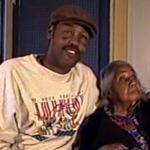Interviewer: Black History Club students, Jefferson Middle School, Eugene, Oregon
Interview Date: February 17, 1993
Location: Mims residence, Eugene, Oregon
Duration: 0:32:46
The interview begins with a discussion about what Eugene, Oregon was like when Annie Mims first moved there. She says that people weren’t friendly to the Black residents at that time, and that there were only about four Black families living in Eugene. She says that there’s less racism now than there has been in the past. The interviewers then begin asking questions of Willie Mims, Annie Mims’ son. He talks about the jobs that were available to Black people in the past, including field labor and janitorial work. Willie Mims then discusses the social life of the Black community in Eugene, and reminisces about the parties and luncheons that they had. He explains that the schools in Eugene often treated Black students poorly when compared to white students, but that he generally enjoyed school. The interview concludes with Willie Mims offering advice to young people and saying that they should learn all they can while they have the opportunity.
Annie Mims (1902-1995) was born in Marshall, Texas and moved to the Pacific Northwest in the 1940s so that her husband, C.B., could find work in the timber industry. The Mims family moved to Eugene in 1947. Willie Mims was born in Texas in 1936, but moved to Eugene, Oregon, when he was a young child. He attended Whitaker Elementary School and Eugene High School.
Please note that this interview includes remembrances of a culture of racism and the use of racist, derogatory language toward African Americans, including the N word.
Dublin Core
Title
Description
Annie Mims (1902-1995) was born in Marshall, Texas and moved to the Pacific Northwest in the 1940s so that her husband, C.B., could find work in the timber industry. The Mims family moved to Eugene in 1947. Willie Mims was born in Texas in 1936, but moved to Eugene, Oregon, when he was a young child. He attended Whitaker Elementary School and Eugene High School.
Please note that this interview includes remembrances of a culture of racism and the use of racist, derogatory language toward African Americans, including the N word.

